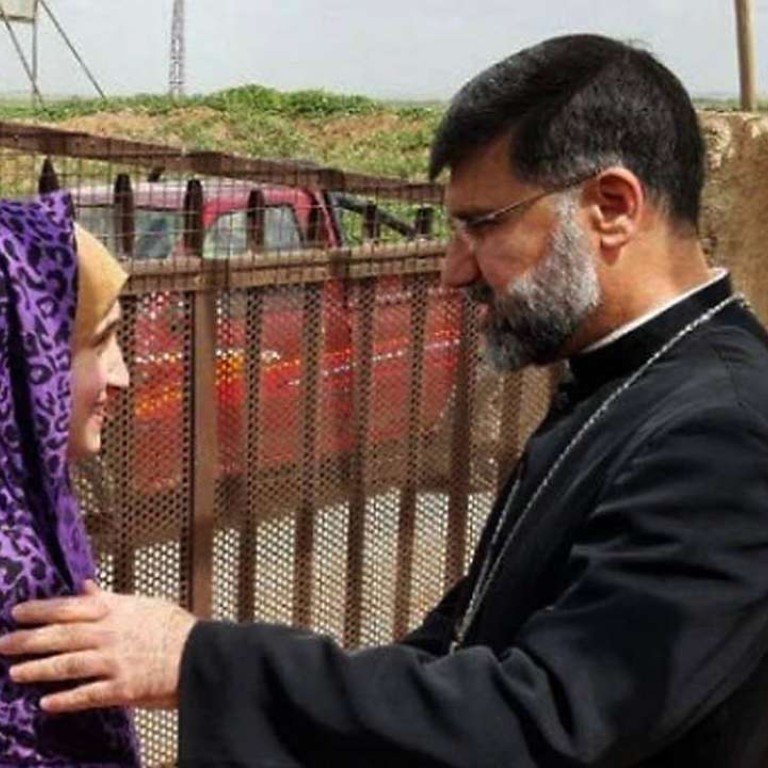
‘This man is a saint’: how a bishop raised millions in ransom money to free 226 hostages from Islamic State
Paying ransoms is illegal in the US and most of the West, and the idea of giving money to IS is morally fraught, even for those who saw no alternative
Deep inside Syria, a bishop worked secretly to save the lives of 226 members of his flock from Islamic State (IS) by collecting millions of dollars from around the world to buy their freedom.
Honestly, this man should go down as a saint, the things that he’s done, the sacrifices he’s made to help these people
It took more than a year, and videotaped killings of three captives, before all the rest were freed.
Paying ransoms is illegal in the US and most of the West, and the idea of giving money to IS is morally fraught, even for those who saw no alternative.
“You look at it from the moral side and I get it. If we give them money we’re just feeding into it, and they’re going to kill using that money,” said Aneki Nissan, who helped raise funds in Canada.
“[But] to us, we’re such a small minority that we have to help each other.”

When the villages were attacked, fleeing residents phoned cousins, sons, daughters, friends – Assyrians who had left the region in waves for the West.
In the chaos, no one was sure how many were taken captive – but everyone was certain they were going to die. As days stretched into a week, it became clear IS had other plans.
The group told the 17 men captured from one village, Tal Goran, they could have their freedom but with a catch. Four female captives would remain, and one of the men had to deliver a message to their bishop in the town of Hassakeh about 40 miles away, and return with an answer. The extremists demanded US$50,000 per person for the whole group. Abdo Marza reluctantly agreed. His six-year-old daughter was one of the captives.
It took the bishop, Mar Afram Athneil, three days to make a decision, as he consulted with members of the church around the world on what to do. Then he gave Marza a sealed envelope, with no explanation.


With that, his daughter and three old women were freed. Athneil began secret negotiations for the remaining captives.
When word filtered down about the ransom, the price was daunting. IS’s starting demand of US$50,000 a person would mean more than US$11 million for the remaining captives.
The calls for donations went out across social media. In Germany, Assyrian entrepreneur Charli Kanoun persuaded the government to accept the Tal Goran hostages, and then he began fundraising for the others. Outside London, Andy Darmoo also fundraised while running his chandelier business.


“When that happened, everybody went crazy and money started flying in from all over,” said Assyrian filmmaker Sargon Saadi, who travelled to Khabur in search of answers. “Assyrians don’t have an army to go rescue them. They don’t have SWAT teams, they don’t have SEAL 6. The only option they have is to pay ransom.”


Assyrians don’t have an army to go rescue them ... The only option they have is to pay ransom
Brokered by the bishop, Athneil, negotiations resumed in mid-fall. The money went into an account in Irbil, Iraq. From November, releases took place every few weeks. On February 22, 2016, a final list of 43 names was sent to the bishop. The last Khabur captives were on their way out.
But when the bus arrived in Hassakeh, only 42 hostages were on board. Sixteen-year-old Maryam David Talya had been pulled off at the last checkpoint by an IS guard, Kanoun said. After another agonising month of negotiations, Maryam stumbled into the arms of her parents.
How much was ultimately paid remains a mystery. The bishop, the only person with a full accounting, declined to comment.
Those involved credit him for saving the lives not just of the hostages but of hundreds of other Assyrians who fled the war zone. The Khabur valley is now all but empty of its Christians.
“Honestly, this man should go down as a saint, the things that he’s done, the sacrifices he’s made to help these people,” Nissan said. “He’s refusing to leave Syria until all his flock is secured.”

